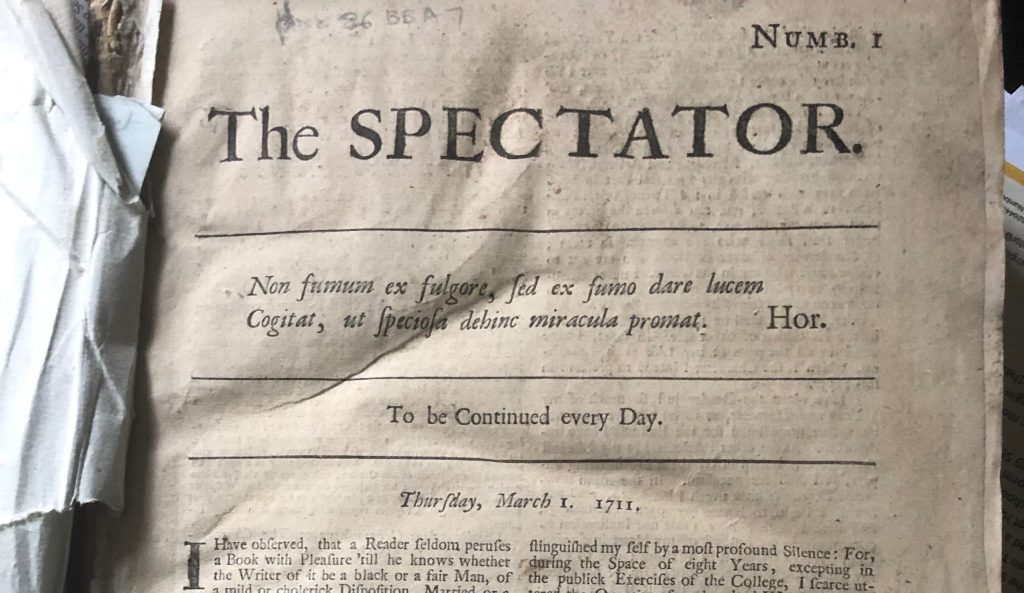The Spectator has always known when and how to wield the scalpel. A tour through its history reveals how, from the get-go, it mercilessly parodied the world in which it lived.
When still six weeks young, The Spectator savaged the morbid obsessions of late-Georgian society. The caricaturist George Cruikshank exposed the press’s fetishization of a contemporary murder: the accompanying article, ‘Points of Horror!!!!’, tartly noted that ‘the taste for murder in the enlightened public’ was ‘so extravagantly eager, that murderers will come to be held in the light of public benefactors’.
As for the coronation ceremony of Queen Victoria in 1837, it was deemed to have combined ‘that love of noise and tinsel which barbarians and children are understood to share in common’.
The golden age of Spectator satire came in the 1950s. Bernard Levin, under the guise of ‘Taper’, became the father of the modern parliamentary sketch. This acid-penned whippersnapper held Britain’s bumbling politicians in disdain — as he reasoned: ‘In some countries, when this state of affairs has continued long enough, they have a revolution; here we laugh at them.’
Scornful of the governing class, The Spectator turned from politics to the fast-changing cultural scene. Readers were invited to play parodic board games: one double-spread mocked the cliquey world of ‘The Establishment’ (a term propagated by The Spectator), where players learned ‘how to get on without actually doing anything’.
Under the urbane editorship of Nigel Lawson, satire still packed a punch. In 1968, Peregrine Worsthorne satirized the outrage over the Catholic ban on contraception. He forecast what furore a ban on extramarital sex would bring: ‘Adultery, after all, can be a deeply fulfilling act.’
On occasion, such ribaldry was too rich for readers. A 1971 article caused the most subscription cancellations in Spectator history. The enfant terrible Tony Palmer launched into Princess Anne’s private life, exploring with sarcastic glee its opening question: ‘Has Princess Anne had sex?’
More successful, if only readable through the fingers, was Auberon Waugh, who emulated his father’s devotion to The Spectator. Waugh adopted a style that ridiculed any prevailing orthodoxy by deploying almost incredible verbal aggression.
In 1985, Kingsley Amis published an A-Z guide to Thatcherite Britain, ‘Sod the Public’, covering everything from counties to architecture. Under ‘P’, he warned that ‘Any pub redesigned internally in the last 10 years or so is likely to be uninhabitable.’ The rule stands strong.
Often, though, The Spectator found it easier to satirize itself. Premier parodist Craig Brown conjured up ‘Wallace Arnold’, whose ‘Afore Ye Go!’ column mocked the self-importance of a certain class of reader. The series inevitably sent up Amis himself, still trumpeting the world’s faults: ‘Mirrors,’ Arnold reads from his friend’s draft, ‘used to be perfectly all right, showing a perfectly decent and engaging young man. Now only show grumpy buffoons.’
That same year, 1988, the City correspondent Christopher Fildes foresaw a dystopian future, where Europe was enforcing a shared currency. When the UK contingent complained that this was like ‘trying to impose a common temperature across Europe by jamming all the thermometers’, the other governors ‘considered a proposal to expel him but decided that a more appropriate punishment was to force him to remain a member’.
Recent years have been trickier: the chaos of Brexit, Trump and Twitter-driven politics has created a news churn that often seems post-satirical. Still, when opportunity knocks, The Spectator opens the door: last year Sahil Mahtani, an investment strategist, lodged tongue in cheek to argue that Britons of Anglo-Saxon heritage deserved reparations for the Norman Conquest.
But any such salvo is risky: it has never been easier to wrest comments from their context and peddle them as ‘violent speech’. Unless you’re a cartoonist (they have played by their own rules on these pages for 65 years) your words may come to march you off. For many, suffice to say, satire is no laughing matter, neither savored for its barbs nor suffered for its bite. Some are offended. Some aren’t. Some laugh. And some don’t. But The Spectator is in no mood to change the habit of a lifetime.
10,000 Not Out: The History of The Spectator 1828-2020 is published this week. This article was originally published in The Spectator’s 10,000th UK magazine. Subscribe to the US edition here.


















